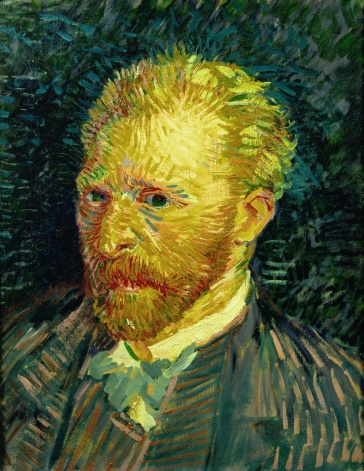
In a letter to his brother Theo, dated September 1882, found in Ever Yours: The Essential Letters, Vincent van Gogh describes the advantages of never learning to paint.
While making it I said to myself: let me not leave before there’s something of an autumn evening in it, something mysterious, something with seriousness in it.
However, because this effect doesn’t last, I had to paint quickly. The figures were done with a few vigorous strokes with a firm brush — in one go. I was struck by how firmly the slender trunks stood in the ground — I began them using a brush, but because of the ground, which was already impasted, one brushstroke simply disappeared. Then I squeezed roots and trunks into it from the tube, and modelled them a little with the brush. Yes, now they stand in it — shoot up out of it — stand firmly rooted in it. In a sense I’m glad that I’ve never learned how to paint. Probably then I would have LEARNED to ignore effects like this. Now I say, no, that’s exactly what I want — if it’s not possible then it’s not possible — I want to try it even though I don’t know how it’s supposed to be done. I don’t know myself how I paint. I sit with a white board before the spot that strikes me — I look at what’s before my eyes — I say to myself, this white board must become something — I come back, dissatisfied — I put it aside, and after I’ve rested a little, feeling a kind of fear, I take a look at it — then I’m still dissatisfied — because I have that marvellous nature too much in mind for me to be satisfied — but still, I see in my work an echo of what struck me, I see that nature has told me something, has spoken to me and that I’ve written it down in shorthand. In my shorthand there may be words that are indecipherable — errors or gaps — yet something remains of what the wood or the beach or the figure said — and it isn’t a tame or conventional language which doesn’t stem from nature itself but from a studied manner or a system.
This piece originally appeared on Farnam Street.
Join over 50,000 readers and get a free weekly update via email here.
More Must-Reads From TIME
- The 100 Most Influential People of 2024
- The Revolution of Yulia Navalnaya
- 6 Compliments That Land Every Time
- What's the Deal With the Bitcoin Halving?
- If You're Dating Right Now , You're Brave: Column
- The AI That Could Heal a Divided Internet
- Fallout Is a Brilliant Model for the Future of Video Game Adaptations
- Want Weekly Recs on What to Watch, Read, and More? Sign Up for Worth Your Time
Contact us at letters@time.com